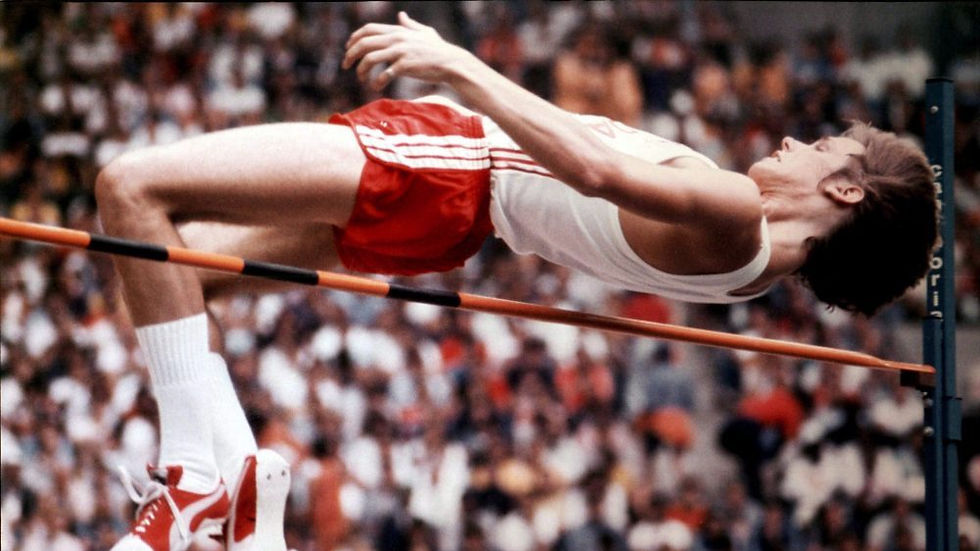Defining Moments
- Ian Hyde-Lay

- Aug 8, 2021
- 4 min read
Updated: Aug 9, 2021
July 31, 1976. A cool, rainy Saturday evening in Montreal. My father and I sit high up in the main stand at the Olympic Stadium. Down below, a small number of exhausted runners trudge forlornly around the track, completing the final stage of the marathon.
No one pays them the slightest attention. Instead, all eyes focus infield. There, a sole figure, tall and stringy, stands among the puddles on the high jump apron.
It has been a controversial Olympics, the event itself dogged by boycotts, financial disasters, drug cheats and other squabbles. For Canada, as host country, athletic successes have been few and far between.

The bar is set at 2.23 meters, almost 7’4”. Greg Joy faces a third and final attempt to clear the height. Success will guarantee at least a silver medal finish. He rocks back and forth, clapping his hands, exhorting the mostly partisan crowd to follow suit.
And then he begins to move. Sweeping forward in an arc, lithe and agile, with huge bouncy strides, he approaches the bar. Somewhere in the background, the Olympic flame flickers in the gloom.

The tiny pockets of water make for treacherous footing. Nonetheless, Joy plants securely, then soars upward as the assembled throng holds its collective breath. Time seems to stand still.
Then, all at once we comprehend what has taken place. Joy stands triumphant in the pit, arms aloft after a successful jump. Thousands upon thousands of rabid supporters explode in sheer jubilation, the yelling, screaming and thunderous applause rolling like huge waves throughout the arena. It is an iconic moment, and one which sets the entire country alight.
For me, an impressionable teenager and now shaking with excitement, it only confirms what I already know. An Olympic Games, for all its potential warts, is the ultimate competition.

Fast forward nearly a half century. A global pandemic ensures that Tokyo 2020 is delayed by one full year, at extreme risk of even being cancelled outright due to the raging coronavirus situation. Happily, for sports fans at least, the Games eventually do go ahead, albeit without live audiences and in bio secure bubbles.
July 27. On the heels of a spectacularly successful 2016 Olympics debut in Rio, Men’s Rugby Sevens reach the quarterfinal stage. In one of the four contests, South Africa squares off vs Argentina.

The Blitzbokke, though missing the commanding presence of coach Neil Powell, sidelined by Covid, field an imposing lineup. The ever-improving Pumas, gritty and determined, are many people’s pick as a dark horse to reach the podium.
A riveting contest unfolds. While a first minute converted try gives South Africa an early 7-0, what follows is stunning. A late and dangerous challenge by Gaston Revol sees the Argentinian playmaker deservedly red carded with more than 11 minutes remaining in the match. Distraught, he leaves the field in tears.
A crushing defeat for the Pumas now seems certain, as playing shorthanded in 7s, even for a minute or two, is extremely difficult, given the amount of territory to cover in both attack and defence. To face being down a man for virtually the entire match is unthinkable.
Yet, Argentina refuses to lie down and accept the inevitable. In a staggering display of skill, courage and will power, the remaining players, led superbly by captain Santiago Alvarez, band together to make the best of a decidedly dicey situation.
Indeed, it is star winger Marcos Moneta who especially steps to the fore. Against the run of play, the youngster shows off breathtaking speed to register a brace of tries. Somehow, someway, Argentina turns impending disaster into an improbable 14-7 lead at intermission. The most unlikely of semi-final berths, and with it a coveted medal opportunity, may just be in reach.

When the starry Alvarez extends the lead to 19-7 late in the second half, mission impossible seems on the verge of completion.
If only. With less than a minute to play, South Africa gains possession of the ball, finally makes proper use of its man advantage. A certain scoring pass is knocked down illegally by a despairing Lautaro Bazan Velez, who is sent to the sin bin, rugby’s equivalent of the penalty box. To start there were seven Pumas on the field, then there were six. Now just five Pumas remain. The score line sits at 19-14 to Argentina, but with time left for one dramatic final passage of play.

In the end, it doesn’t matter. Magically, the South Americans cling on, claiming the ensuing kickoff under extreme pressure, then booting the ball high into the empty stands. The final whistle confirms an absolutely remarkable victory and sparks wild celebrations.
Inevitably, each Olympic cycle reaches conclusion. The Tokyo lights, as did those in Montreal long ago, fade to black. Still, the next captivating jumble of global sport, set for Paris in 2024, will arrive soon enough. Take solace in the fact that at every turn, in spite of various troubling issues, the Games never fail to produce a steady diet of heroes and history made. Of dreams realized, of barriers, once unattainable, overcome. So many examples of strength and supreme athleticism, of mettle, resilence and self-belief. Of unselfishness, hard work, humility and character. Of the greatest joys and the most extreme disappointments.
Intensely personal to each athlete, coach, team, family, supporter, even country, they become defining moments that last forever.




Comments